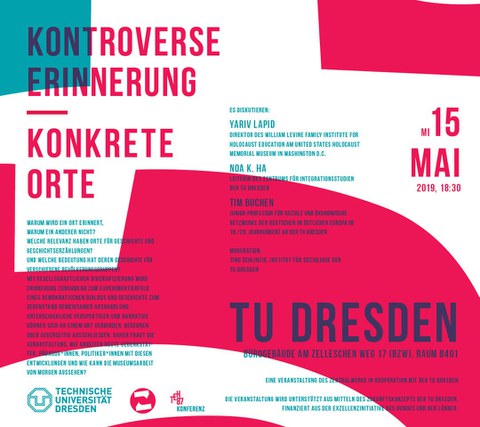May 03, 2019
Kontroverse Erinnerung - Konkrete Orte
Kontroverse Erinnerungen - konkrete Orte
A panel discussion by ZENTRALWERK and TU Dresden in the context of the Trans Europe Halles conference »pARTicipation»
Participation through art? Under the heading »pARTicipation», ZENTRALWERK Dresden is hosting one of the annual conferences of the pan-European network of independent cultural institutions Trans Europe Halles (TEH) in the state capital from 16 to 19 May 2019. As part of this international meeting, TU Dresden will host a panel discussion with guests of the conference. The Israeli historian Yariv Lapid, whose theses are controversial and who works at the United States Holocaust Memorial Museum in Washington D.C., junior professor at the TU Dresden Tim Buchen and the integration researcher Noa K. Ha will discuss. The focus is on the relationship between memory culture and concrete places of remembrance. The starting point is the observation that in the course of social diversification, memory is increasingly becoming the experimental field of a democratic dialogue and history the subject of joint negotiation. Different perspectives and narratives can connect, encounter or mutually exclude each other at one place. But why is one place remembered and another not? What relevance do places have for history and historical narratives? And what significance does their history have for different population groups? These questions will be explored in short keynote speeches by the panelists and the subsequent discussion.
Date: Wednesday, 15 May 2019, 6:30 pm
Location: TU Dresden, office building at Zellescher Weg 17 (BZW), room B401
Discussing:
Yariv Lapid, Director of the William Levine Family Institute for Holocaust Education at the United States Holocaust Memorial Museum in Washington D.C.
Noa K. Ha, Director of the Centre for Integration Studies at the TU Dresden
Tim Buchen, Junior Professor for Social and Economic Networks of Germans in Eastern Europe in the 19th/20th Century at the TU Dresden
Moderation:
Tino Schlinzig, Institute for Sociology at the TU Dresden

